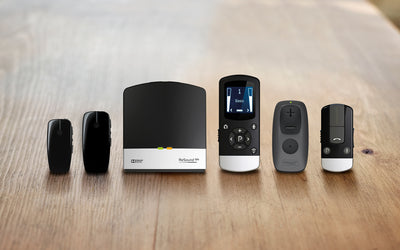By
Niamh Harnett
While hearing loss can present unique challenges in experiencing the world of sound, it doesn't mean that the joy and benefits of music are forever out of reach. Music training can open doors to a world of possibilities including enhanced cognition, increasing emotional well-being, social connections, and personal empowerment.

Enhanced Speech Perception In Noise
A review published in the Journal of Audiology and Otology in 2023, suggested that music training can enhance speech perception in noise (SPIN) by improving auditory discrimination skills, enabling individuals to perceive subtle sound differences that are crucial for speech comprehension.
Music training also enhances attention and working memory, which can help people filter out background noise and focus on relevant speech signals. A similar study in 2020 found that music training through music apps and music therapy significantly improved speech perception in noise of 14 children aged between 6 and 9.
Emotional Wellbeing
Music training provides an outlet for self-expression and creativity. It can evoke positive emotions, reduce stress, and enhance overall mood. Participating in music-making activities such as playing an instrument or singing can contribute to improved emotional well-being and quality of life.
Social Life
Music training or playing an instrument can also allow you to connect with others who are going through a similar journey. Social connections can be the key to happiness, the more people you can engage with in a positive way, the happier you are likely to be. Joining music groups, choirs, or ensembles provides opportunities for individuals with hearing loss to engage with others who share their passion for music.
Non-Noise Related Cognitive Ability
Not only does music training allow your brain to pick up small changes in noise, it can also improve other areas of the brain that involve attention, memory, and problem-solving skills.
A 2020 study into music training and brain volume showed that those engaging in music training and musical practice showed larger volumes in certain areas of the brain involved with non-noise related brain functions such as memory and emotion.
Music training has been shown to have a positive impact on various aspects of speech perception and processing. Whether you're a musician, a parent, or an educator, recognising the value of music training can lead to improved speech perception skills and a better overall listening experience. Engage in musical activity with others to enhance your social life and improve your wellbeing with others on a similar journey.
If understanding speech in noise is important, the brand new Phonak Lumity slim features 16% enhanced speed understanding than previous Phonak models. Artificial intelligence also found in our range of Resound and Signia hearing aids can seamlessly adjust the hearing aid settings automatically as you move from quiet to loud environments.
Explore our full range of hearing aids via the menu or get in touch with one of our expert UK audiologists with any questions about your hearing journey.

Shop All Hearing Aids
Shop now
Shop Accessories
Shop now
Speak To Our Audiologists
Contact Us
